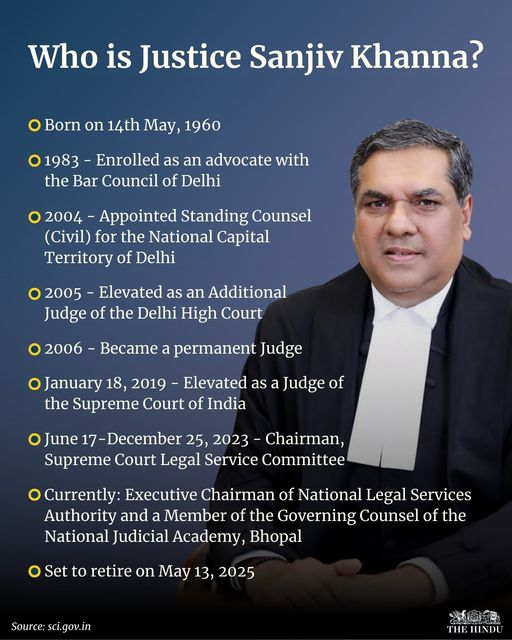Justice Sanjiv Khanna Appointed as Next Chief Justice of India
Why in the news?
Justice Sanjiv Khanna will become India’s 51st Chief Justice on November 11, succeeding CJI DY Chandrachud. Known for landmark rulings, his term extends until May 13, 2025.
Justice Sanjiv Khanna Appointed as Chief Justice of India:
- Justice Sanjiv Khanna has been appointed as the next Chief Justice of India, with his term set to begin on November 11.
- Law Minister Arjun Ram Meghwal announced the appointment, approved by President Droupadi Murmu following consultation with current CJI DY Chandrachud.
- Justice Khanna, the second senior-most judge in the Supreme Court, will serve as the 51st Chief Justice of India until his retirement on May 13, 2025.
Distinguished Judicial Career:
- Elevated to the Supreme Court on January 18, 2019, Justice Khanna has contributed significantly through landmark rulings.
- His judgments focus on fundamental rights like personal liberty, democratic participation, and individual autonomy.
- Justice Khanna is known for his meticulous preparation, pragmatic approach, and commitment to effective dispute resolution.
Key Facts about Chief Justice of India (CJI):
- Qualifications: Must be an Indian citizen and have served as a High Court judge for 5 years, an advocate for 10 years, or be a distinguished jurist.
- Appointment Process: Appointed by the President per Article 124(2); outgoing CJI recommends successor, processed via Union Law Minister and Prime Minister.
- Collegium System: Led by CJI, includes four senior Supreme Court judges; overseas appointments and transfers.
- Administrative Role: As “Master of Roster,” allocates cases, selects bench sizes, and can influence outcomes.
- Removal: Requires Presidential order after a Parliament address with a two-thirds special majority; grounds include misbehaviour or incapacity (Article 124(4)).
- Transparency: CJI office is under RTI Act since
Article 124: Appointment of Chief Justice of India (CJI)
- No Specified Procedure: The Constitution does not outline a procedure for appointing the CJI.
- Article 124(1): States, “There shall be a Supreme Court of India consisting of a Chief Justice of India.”
- Article 124(2): Specifies that Supreme Court judges, including the CJI, are appointed by the President.
- Conventional Process: In the absence of a formal constitutional provision, CJI appointment follows the convention of the outgoing CJI recommending a successor.
Sources Referred:
PIB, The Hindu, Indian Express, Hindustan Times




